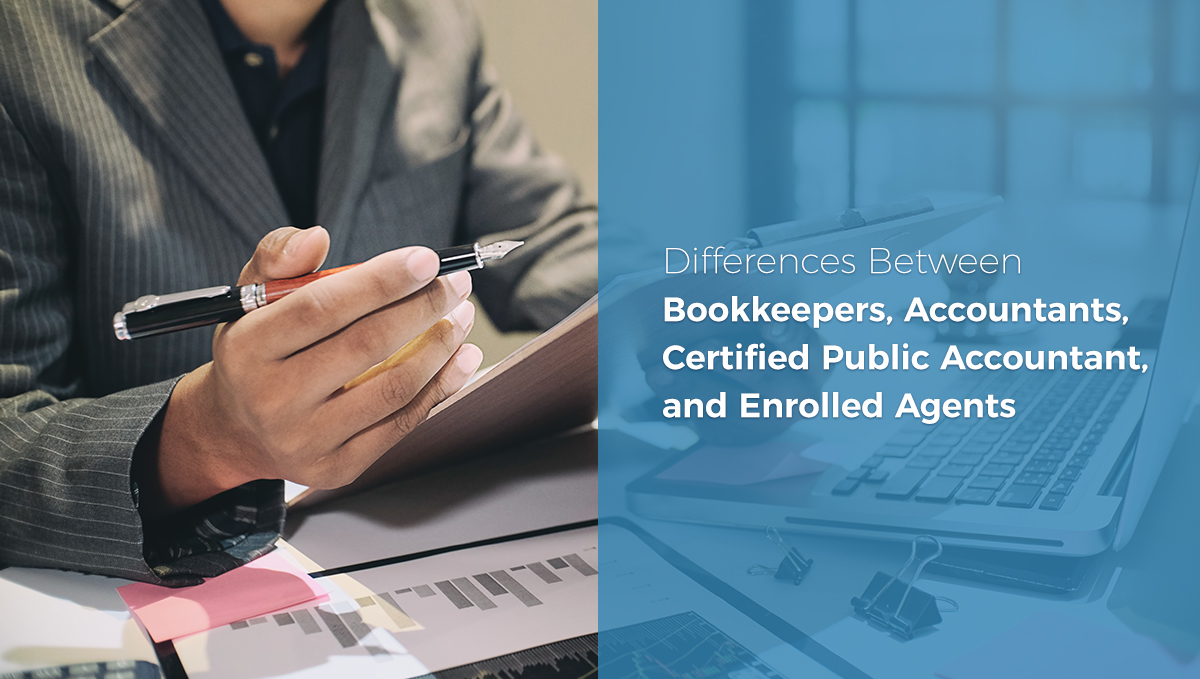You may have heard about the terms bookkeeper, accountant and Certified Public Accountant (CPA), but you may not have heard about Enrolled Agents (EAs). You may also have noticed that these terms often get used interchangeably. Yet, there are some significant differences between them.
1. Bookkeepers
Traditional bookkeepers don’t need to have a college degree. Their main tasks revolve around day-to-day recording of business transactions and monthly accounting cycles. Their duties consist in entering transactions into bookkeeping journals and preparing monthly reports.
In some cases, bookkeepers are also responsible for Accounts Payable or Accounts Receivable. Some of their other responsibilities may include payroll, collection activities and bank deposits.
More experienced or certified bookkeepers grow in their careers to become accountants. In many instances, bookkeepers may work closely with accountants. In terms of salaries, bookkeepers may be less costly to a business than accountants or Certified Public Accountant (CPA).
The Enrolled Agent (EA) will make use of the bookkeepers’ records to prepare the business’ taxes.
2. Accountants
Unlike bookkeepers, most accountants have college degrees in accounting or 120 to 150 college credits. Their duties generally involve more complex transactions, and adjustments to a company’s books. These include computing the allowance for accounts receivable or depreciation. They are also more likely to work for larger companies.
Bookkeepers record financial transactions. Accountants interpret and classify financial data.
They may also prepare financial statements and perform tax planning activities.
3. Certified Public Accountants (CPA)
Besides a college degree, CPAs also have an extra 30 hours of college coursework. They take a standardized exam to earn their state licenses.
CPAs can handle a variety of complex tasks for businesses and individuals. They perform activities such as tax preparation, financial planning, and investment planning. They may also be in charge of preparing and maintaining financial statements. They can also be involved in audits.
Many careers are available to CPAs in public or corporate accounting. Many CPAs get promoted to high-level executive positions as controllers, for instance. They also give advice in areas like internal and external auditing and forensic accounting.
4. Enrolled Agents (EA)
Enrolled Agent a federally authorized tax professional, who has technical expertise in the field of taxation and is empowered by the US Department of the Treasury to represent taxpayers before all administrative levels — examination, collection and appeals — of the IRS.
Like the CPA they must pass a 3-part exam, all based on tax and tax laws. EAs must complete 72 hours of continuing education every 3 years. They also adhere to strict ethical standards.
When Should Bookkeepers, Accountants, CPAs and/or EAs be hired?
Bookkeepers perform technical transactions requiring less proficiency and training than accountants. The more complex the operations or the organization is, the more important it is to hire an accountant with more expertise.
Accountants or CPAs may perform more technical accounting tasks requiring more expertise. Companies also hire them to provide managerial advice.
Enrolled Agents (EAs) are used for their tax expertise and their ability to represent clients before the IRS.
Are you wondering about the differences between bookkeepers, accountants, CPAs, and EAs? Contact us for a free consultation at (561) 842-1304.
Sources:
- “The Differences Between Bookkeepers Vs. Accountants Vs. CPAs.” The Finance Base. Accessed August 26, 2017. http://thefinancebase.com/differences-between-bookkeepers-vs-accountants-vs-cpas-4980.html.
- Staff, Investopedia. “Certified Public Accountant – CPA.” Investopedia. November 19, 2003. Accessed August 26, 2017. http://www.investopedia.com/terms/c/cpa.asp.
- CPA VS Accountant. Accessed August 26, 2017. http://www.accountingedu.org/cpa-vs-accountant.html.
- “What’s the Difference Between a Bookkeeper and an Accountant?” QuickBooks. May 19, 2017. Accessed August 26, 2017. https://quickbooks.intuit.com/r/bookkeeping/whats-the-difference-between-a-bookkeeper-and-an-accountant/.





